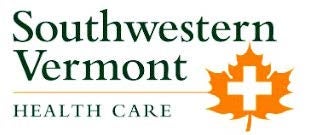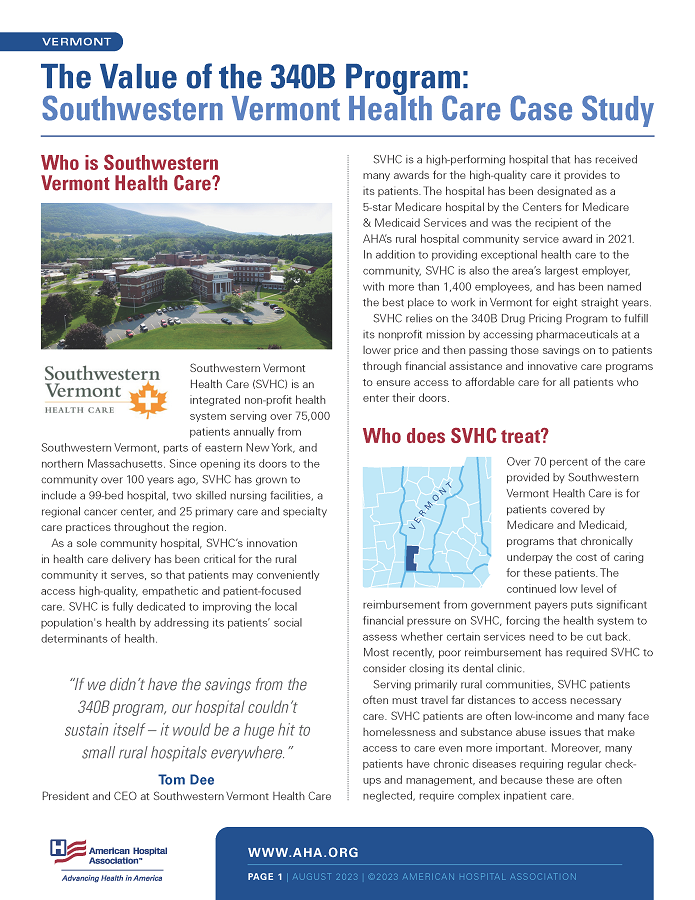

Southwestern Vermont Health Care | Vermont
The Value of the 340B Program Case Study
Who is Southwestern Vermont Health Care?

 Southwestern Vermont Health Care (SVHC) is an integrated non-profit health system serving over 75,000 patients annually from Southwestern Vermont, parts of eastern New York, and northern Massachusetts. Since opening its doors to the community over 100 years ago, SVHC has grown to include a 99-bed hospital, two skilled nursing facilities, a regional cancer center, and 25 primary care and specialty care practices throughout the region.
Southwestern Vermont Health Care (SVHC) is an integrated non-profit health system serving over 75,000 patients annually from Southwestern Vermont, parts of eastern New York, and northern Massachusetts. Since opening its doors to the community over 100 years ago, SVHC has grown to include a 99-bed hospital, two skilled nursing facilities, a regional cancer center, and 25 primary care and specialty care practices throughout the region.
As a sole community hospital, SVHC’s innovation in health care delivery has been critical for the rural community it serves, so that patients may conveniently access high-quality, empathetic and patient-focused care. SVHC is fully dedicated to improving the local population's health by addressing its patients’ social determinants of health.
SVHC is a high-performing hospital that has received many awards for the high-quality care it provides to its patients. The hospital has been designated as a 5-star Medicare hospital by the Centers for Medicare & Medicaid Services and was the recipient of the AHA’s rural hospital community service award in 2021. In addition to providing exceptional health care to the community, SVHC is also the area’s largest employer, with more than 1,400 employees, and has been named the best place to work in Vermont for eight straight years.
SVHC relies on the 340B Drug Pricing Program to fulfill its nonprofit mission by accessing pharmaceuticals at a lower price and then passing those savings on to patients through financial assistance and innovative care programs to ensure access to affordable care for all patients who enter their doors.
“If we didn’t have the savings from the 340B program, our hospital couldn’t sustain itself – it would be a huge hit to small rural hospitals everywhere.”
Who does SVHC treat?
 Over 70 percent of the care provided by Southwestern Vermont Health Care is for patients covered by Medicare and Medicaid, programs that chronically underpay the cost of caring for these patients. The continued low level of reimbursement from government payers puts significant financial pressure on SVHC, forcing the health system to assess whether certain services need to be cut back. Most recently, poor reimbursement has required SVHC to consider closing its dental clinic.
Over 70 percent of the care provided by Southwestern Vermont Health Care is for patients covered by Medicare and Medicaid, programs that chronically underpay the cost of caring for these patients. The continued low level of reimbursement from government payers puts significant financial pressure on SVHC, forcing the health system to assess whether certain services need to be cut back. Most recently, poor reimbursement has required SVHC to consider closing its dental clinic.
Serving primarily rural communities, SVHC patients often must travel far distances to access necessary care. SVHC patients are often low-income and many face homelessness and substance abuse issues that make access to care even more important. Moreover, many patients have chronic diseases requiring regular checkups and management, and because these are often neglected, require complex inpatient care.
What’s the value of the 340B Program for SVHC and its patients?
Savings from the 340B program have enabled Southwestern Vermont Health Care to meet patient needs through workforce development programs and specialty and primary care services:
Transitional Care Nursing Program
Through its transitional care nursing program, SVHC has kept more patients from returning to the hospital by having nurses travel to patient homes to provide support services and ensure they are safely set up to recover. By proactively addressing the needs of these patients, SVHC has been able to better target the root of patients’ health problems and significantly reduce readmissions and the average length of stay since the program began in 2014.
Oncology
Many oncology patients face hardships traveling far distances to access critical oncology services. Because of the savings generated by the 340B program, SVHC was able to open a community cancer center, accredited by the American Cancer Society, and several community-based clinics that provide access to cancer care closer to patients’ homes and at often a reduced cost. This means more cancer patients can get the care they need, when they need it, often in their local community, which means they are better able to respond to the treatment and beat the disease.
Expanded Primary Care
Recognizing the dearth of primary care services in the region, SVHC has prioritized the expansion of these services to the communities it serves. 340B savings have allowed the hospital to open primary care clinics in communities that are underserved and at particularly high-risk for chronic diseases. These clinics have resulted in more patients getting access to care in their local communities rather than coming to the emergency room or requiring inpatient care for their health care needs.
Improving the Staffing Pipeline
Like many providers across the country, SVHC has faced critical workforce shortages that have jeopardized its ability to meet patient demand. To address this problem, the hospital has used 340B savings to pilot several innovative programs such as partnering with local colleges to provide tuition forgiveness for certain health care professions, opening the hospital for nursing students to complete clinical rotations, and empowering existing staff who want to transition into a nursing role by paying them while they study. As a result, SVHC has reinvested in its workforce and largely avoided the use of increasingly expensive staffing agencies to fill nursing workforce gaps.
Food Insecurity
Through a partnership with Grateful Hearts — a local charity that provides food to in-need members in the local community — SVHC has prioritized food security and reducing hunger as a way to improve the health and well-being of the communities they serve. Made possible by their 340B savings, SVHC has been able to redistribute excess food to in-need members of the local community.
340B Hospitals Need Support
The 340B program is one of the key supports keeping small, rural hospital doors open, like SVHC, as they continue to face severe financial challenges. As costs continue to rise outpacing reimbursement from Medicare and Medicaid, it is difficult for hospitals like SVHC to maintain an adequate workforce and ensure access to care for their patients. This is especially true as the demand for care and acuity of patients increase. The 340B program helps SVHC offset these costs and maintain access to care — that is why it is so vitally important to the community.
Without the 340B program, small, rural hospitals across the country could be forced to eliminate services, putting many patients at dire risk of worse health outcomes. Cuts to the program and restrictions imposed by pharmaceutical manufacturers are and will continue to have a significant negative financial impact on the savings that enable SVHC to provide crucial programs and services that meet the needs of patients. The federal government must protect the 340B program so that hospitals like Southwestern Vermont Health Care can continue serving their communities for another 100 years.


